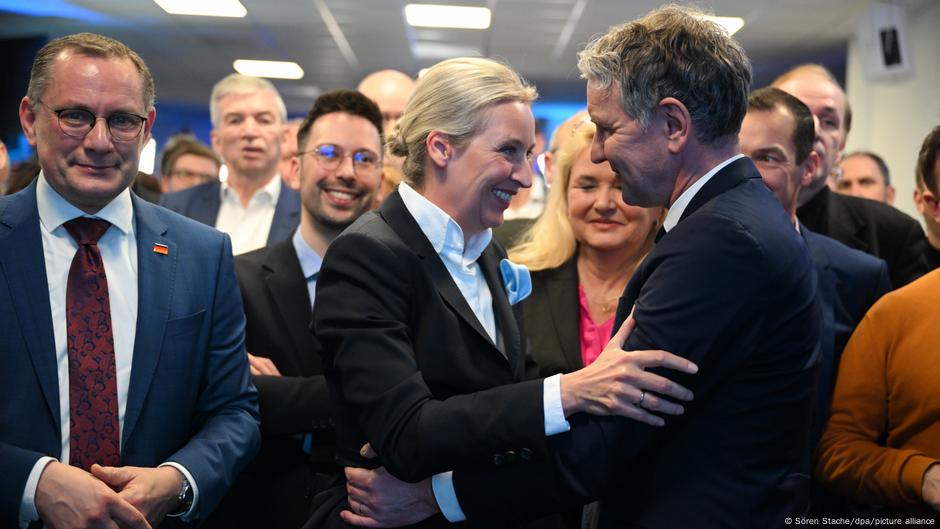
The Alternative für Deutschland (AfD) party has achieved a significant milestone in its history, emerging as the second largest political entity in Germany just 12 years after its establishment.
Securing approximately 20% of the votes, the AfD has nearly doubled its performance compared to the last German elections in 2021.
Notably, in eastern Germany, the party has risen to become the predominant political force.
On election night, lead candidate Alice Weidel reiterated the AfD’s willingness to form a coalition with the victorious center-right alliance led by the Christian Democratic Union (CDU) and its Bavarian counterpart, the Christian Social Union (CSU).
Weidel also directed criticism towards the CDU’s leader, who is likely to be the next chancellor, Friedrich Merz. In response to Merz’s prior commitment to reduce the AfD’s voter support, Weidel remarked to her audience: “They aimed to halve our support, but the reality is quite the opposite!”
The AfD effectively influenced the political debate during its election campaign through its staunch anti-immigration stance, advocating for stricter border controls against refugees and asylum seekers.
Support from Prominent Figures
During the election run-up, US billionaire and close ally of Trump, Elon Musk, made headlines with his public endorsement of the AfD. He was joined by US Vice President JD Vance in expressing their support for the party.
The AfD is regarded by German authorities as partially far-right extremist, with various chapters and members under surveillance by domestic intelligence services due to several provocative statements made by party officials, including questioning the equal rights of individuals with immigration backgrounds.
Additionally, several members have faced scrutiny for their use of prohibited symbols and phrases associated with the Nazi regime. In 2024, Björn Höcke, a prominent AfD figure and chairperson in Thuringia, was convicted on two occasions for employing a banned slogan tied to Hitler’s paramilitary organization, the SA.
In the lead-up to the general elections, large-scale protests occurred across Germany against the AfD, with many viewing the party’s ascendency as a threat to democracy and the safety of migrants.
The AfD’s Status Remains Challenging
Despite its notable electoral victory, the AfD did not meet its own ambitious goals, with many members hoping for a closer contest with the CDU or even landing in first place.
The atmosphere at the AfD’s election night gathering was somewhat subdued, despite their electoral advancements.
New political avenues appear limited for the AfD as Merz reaffirmed in a post-election debate that the CDU will not consider forming a coalition with the party.
“You can extend your hand as much as you wish; we will not endorse policies that are detrimental to this country,” he stated. Merz cited conflicts in foreign and security policies as principal reasons for rejecting cooperation with the AfD.
The far-right party advocates for Germany’s withdrawal from the EU, a return to the national currency, and cessation of military aid to Ukraine.
Directly addressing Weidel, Merz asserted: “Your goals oppose our own, which is why collaboration is not feasible.”
Looking ahead, Alice Weidel has already expressed her ambition to be the AfD’s candidate for chancellor in the upcoming 2029 elections. She confidently declared on the party’s television channel, “We will surpass the CDU/CSU, and secure the mandate to govern.”
This article was originally published in German.
Stay informed: Every Tuesday, DW editors provide insights into the latest developments in German politics and society. Subscribe here for the weekly newsletter, Berlin Briefing.









